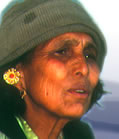 |
 |
||
 |
|||
|
RELATED THEMES conflict education family life gender identity OTHER LOCAL THEMES BACKGROUND |
social relationships
Education has been a significant force for social change in the area and is clearly responsible for breaking down some of the barriers between castes and between the sexes. Tamangs speak of having previously been "dominated" by Bahun and Chettri and being afraid to talk to them: "Now I know something they can't dominate me" (Nepal 4). He goes on to say: "We are all the same. If we cut our vein, the blood comes out red." Some, mostly higher castes, now claim that everyone is treated equally. Despite this positive reading of the situation, there is a certain amount of repetition of negative stereotypes: Tamangs always "drink too much", for example. Some people are more pessimistic about the prospect of change in relation to caste: one says nothing can be done about discrimination; another describes growing inter-caste tensions and one says crime has increased because people are less tolerant now. Marrying outside the caste is still largely discouraged, although marriage between sub-castes is acceptable. When inter-caste marriages do occur, both partners' status falls to the lower of the two castes. Several new interviews illustrate that caste prejudice remains a powerful force (Nepal 24 and 27); in one instance it sabotages a woman's attempt to set up a small shop as part of a savings scheme (Nepal 28). Relations between the generations seem to be undergoing some changes, with young people demanding more freedom, but there does not appear to be quite as much tension or discontinuity between older and younger generations as in some collections. Younger people, according to at least one disapproving narrator, are less caste-conscious: "When we ask school and college students not to eat anything touched by the lower castes, they retort; 'Why not? Do the lower castes have two respiratory systems? They have teeth and mouths just like ours.' That is why the caste system is disappearing. It wasn't so bad even 8-10 years ago. There was some respect and a value system. Now nothing remains" (Nepal 19). Several older women who have had very hard lives speak disparagingly of young people's desire to watch TV and eat processed foods. A disabled man, who is unmarried, talks about being well treated by his fellow villagers and seems fairly confident that his brothers will look after him if he becomes unable to work; meanwhile, he advocates self-reliance and helping others. In fact, some interviews indicate that mutual help remains a strong feature of the community. On the other hand, there are complaints about individuals acting selfishly by cutting down trees. And several feel that democracy has been interpreted by some as an excuse do just what they want: "...with the advent of democracy, it has become a free-for-all - no one to say this can be done, that shouldn't be done. People have started doing as they pleased. There is no hierarchy. There is no common courtesy and respect for old and senior citizens....They even forget that it is wrong to abuse the elderly. When we tell them something, young boys and girls run off nowadays, saying, "Hey. Why listen to these oldies?" (Nepal 19). One striking feature of the new collection (Nepal 24-32) is how the Maoist insurgency has created a climate of fear and suspicion, breaking down trust between members of the affected communities. One woman says: "Everyone in the village was like a brother or sister. We had no inkling at that time who all came to the village from outside, who all stayed, and what all happened. Now [since the Maoist insurgency] it seems like everybody is fighting among themselves" (Nepal 25). quotes about social relationships".Of all the things, the worst is to be poor. I feel like that. If you are poor everyone abuses you and you have to take insults." "In those days people had to run away, seeing new people. Now we don't have that kind of attitude. We told them not to run away, but to try to understand them. We are all the same - if we cut our vein, the blood comes out red. Now people are not afraid. Now everybody can speak freely. Those days, we didn't get the chance to speak.Nowadays people have become fearless." "Before, inter-caste relations were not so good, people were not so friendly with each other, they didn't trust each other. But now, people have realised that we all should live in peace and harmony, they are now friendly and trust each other. Now they respect each other and respect the customs of other castes." "I went two, three times. to the picnics [organised by women's savings group] expecting laughter and merrymaking but it was just the opposite and I felt like crying. It was that bad. We could not touch any food items nor were we allowed to wash, cut and cook food. From morning till evening we had to sit separately from the other [higher caste] sisters." "People here abuse us; abuse us a lot. People of Kathmandu really abuse people coming from the villages. 'Uncivilised,' they say. [they] detest us so much. You have to tolerate so many of their words. The proprietors/masters where we work abuse us [but] we tolerated [the abuse] and stayed." "In those days only Chettri and Bahun had known everything. Everything, power was at their hands. Everybody was afraid to talk to them. Now people have known the value of education and everybody goes to school. That's why nobody runs from one another. All are equal. In those days Tamangs were afraid of them. If they came to village Tamang would look like a dog, which was beaten by stick. They (Bahun and Chettri) would order us to do something, we had to do whatever they had told us. They would give us a choice whether we would do their work or not. If we didn't then they would scold us. Nowadays, they cannot dominate us." |
|